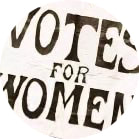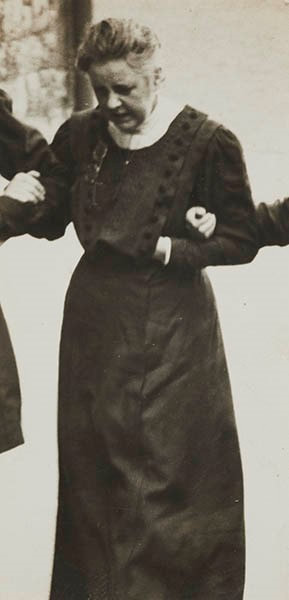|
This group of women includes Annie Evelyn Armstrong one of the youngest suffragettes to be arrested whose detainment along with another young girl brought about a change in the WSPU rules regarding militant action; Louise Archibold, housewife and mother of two based in London and Lillian Armitage socialist supporter from childhood married to a union leader from Bradford, women poles apart but united by a common cause. Helen Archdale was born in 1876. Her mother had been one of the women who had campaigned to be allowed to study medicine at the University of Edinburgh. Helen went to St Andrews University and after graduation commenced work as a journalist. She married and settled in India with her husband, who was in the army. They had three children.
In 1908 Helen returned home and soon afterwards joined the WSPU. Helen was arrested in November 1910 for a breach of peace in connection with a visit to Dundee by Winston Churchill. One of her fellow arrestees was Adela Pankhurst. Found guilty, Helen was imprisoned for ten days. Helen went on hunger strike and, for reasons which are unclear, was released four days later. In November 1911, she was charged with breaking five windows valued at £100. She was sentenced to two months imprisonment. A police officer testified that Helen struck a window at No 4 Grand Hotel buildings with ‘two blows in quick succession’. When arrested Helen retorted ‘all right’.Surveillance papers note that not only did Helen subscribe to the suffragette newspaper for herself she paid for a copy to be sent to her husband stationed in Madras. Based in Sheffield, Helen was the local WSPU organiser, a position that Adela succeeded to when Helen became ill. Like many Helen refused to participate in the 1911 census. Helen campaigned for women’s rights for the rest of her life. Louise Archibold was arrested 4 March 1912 and charged with malicious damage to five windows valued at seven pounds and ten shillings. She was sentenced to four months imprisonment, which highlights the inconsistency of sentencing as such a long sentence for a first offence and a relatively low value for the windows was not always the norm. Due to the sheer number of women arrested some, of whom Louise was one, were moved to prisons outside of London. Louise was sent to Birmingham along with twenty-three other women including Violet Aitken. [see earlier blog] Louise, a married woman, appears on the Roll of Honour of Suffragette Prisoners 1905-1914 with the surname spelt Archibald as opposed to Archibold as recorded on the arrest record. Using either spelling, there is only one marriage that fits the criteria that of William Henry Archibold to Louise Victoria Adams on 14 August 1889 in Kentish Town, north London. The remainder of this entry has been written on the basis that the correct person has hopefully been identified. On her marriage certificate, her father is named as Joseph Adams, a gentleman but no record of her birth or entries on the census return can be located so beyond this there is no background information. One clue is that the 1891 census return records William and Louise being visited by her sister Eva whose birthplace is recorded as France. The family are living in Richmond, and William’s occupation is a publisher. On 16 July 1890 Louise gave birth to their first child, Norah Enid. Ten years later, the family are living in Holloway and Louise has given birth to a son, Andrew, born exactly one year later on Norah’s first birthday. Over a hundred miles away from her family, Louise along with the other women in Winson Green prison went on hunger strike. A file note dated 23 June 1902 records that all twenty-four suffragette prisoners had been force-fed that evening. At this time, the authorities decided to undertake this course of action even if food had been refused for a relatively brief time. In this instance, the women had refused food the previous morning, so the force-feeding occurred less than forty-eight hours later. All bar seven were fed either by nasal or oesophagus tube. Louise was one of those seven who accepted food by a feeding cup. This was not as pleasant as it might first appear. Laura Ainsworth described the process; placed in a chair and held down and her head forcibly held back, her mouth was forced open, four or five wardresses held her in the chair and milk was poured down her through a feeding cup’. It is not clear whether this treatment persisted until her release on 29 June 1912. The 1911 census records the family living in Twickenham, Middlesex. Interestingly neither mother nor daughter is recorded which indicates that they both possibly participated in the suffrage protest against the 1911 census return. The family continued to live in Twickenham on her release. Predeceased by her husband Louise died on 4 March 1951 having retired to Worthing before the Second World War. Helen Arnes (noted in the amnesty records as Armes) was arrested in May 1914. She is stated to be a married woman born in 1857 and living in Croydon, but extensive searches do not reveal any matches. Helen’s case was sent to the Old Bailey for trial along with that of three other suffragettes. The charge was one of conspiracy to damage property. The police raided a flat in Maida Vale, London and found a list of public libraries together with bags of stones and tools. The start of the trial was delayed after an outburst from two of the women who flung a book towards the judge and chucked anything else that came to hand around the court. Mary Richardson was called as a witness for the defence, but she quickly turned giving evidence into an opportunity to state that her mouth had been cut during force-feeding. She was then removed. Helen and one other were cleared of the charges, the other two who had been the ones shouting at the outset were sentenced to three months imprisonment. Sadly, it has not been possible to identify Helen further with any certainty. Lilian Armitage was arrested in February 14th 1907. She was part of the cohort who attempted to enter the House of Commons. At her trial, she was found guilty and ordered to pay twenty shillings or serve fourteen days in prison. Her name is on the Roll of Honour of Suffragette Prisoners. Lillian was born in Leeds in 1885. As a child, she attended the Leeds Socialist Sunday School and as an adult became a teacher in the Bradford Socialist Sunday School. In 1906 she married Matthew Armitage, a trade unionist and gas meter inspector. This was Matthew’s second marriage and a much younger Lillian became stepmother to four children. When Lillian was arrested, she was the Secretary of the WSPU in Bradford and Matthew was President of the Gas Worker’s Union. The Leeds Mercury dated February 15th 1907 includes an interview with Matthew following Lillian’s arrest and imprisonment. Asked how he would manage ‘So I shall be a fortnight by myself, except for the four children. But I shall be able to manage very well. I am very handy in a house myself’. Lillian fell pregnant not long after her release and gave birth to a son Stitt Wilson in December 1907. Several more children followed. Lillian remained involved in the suffrage movement. Matthew died in 1947. Thank you to Peter Armitage for this contribution: Lillian Armitage was my grandmother. Besides being Peter, I also carry my father's and grandfather's name, Matthew. Grandfather Matthew was President of the Gas Workers Union; I'm a Petroleum Engineer working in the oil and gas industry, following the tradition. Very proud of my socialist grandparents at a time when the poor had to fight for everything. Plus ca change, plus ca change pas. Bessie Armstrong, from Manchester, was arrested on 14 December 1906. She was part of a group of women and men who attempted to enter the House of Commons. When they were brought to court charged with obstruction several leading figures in the suffrage movement attended including Christabel Pankhurst and Charlotte Despard. Five women and one man were charged with disorderly conduct and causing an obstruction. Each was fined fourteen shillings or fourteen days imprisonment. None of them was released until after Christmas, and they were denied, visitors. On their release, they were greeted by members of the WSPU, and they returned to Clifford Inn for breakfast all announcing they would gladly return to prison in the cause of women’s suffrage. Bessie is recorded in the newspaper reports as being married, but there is no trace of someone married, of that name in Manchester. Evelyn Armstrong was arrested on 21 March 1907. Her name is given in the press as Annie Evelyn Armstrong of Blackpool. One report going as far as to describe her as “buxom”. At the time of her trial, she was stated to be seventeen years old. After her case, Mrs Pankhurst introduced a rule that no one under twenty-one years old should undertake any activity which could potentially lead to a prison sentence. Many Lancashire mill girls had come south to join a protest outside the House of Commons, and it is often stated that Annie Evelyn was part of this contingent. It is true that there was another young girl involved from the Lancashire mills, but it does not appear that Annie Evelyn was part of them. The only Annie Evelyn Armstrong recorded was born in March 1890 in Reading which would make her seventeen at the time of her arrest. She was the daughter of James and Mary Jane Armstrong who by the 1891 census had moved to Salford, Lancashire. Both her parents and elder brother James were born in Ireland while her elder sister was born in Kent, so; clearly, the family had a peripatetic existence. At her trial, the judge expressed his hope that her parents were there to support her and given her age remanded her for one week. When she was brought before the court again the magistrate stated that the court would pay her expenses home if she were to agree. Annie Evelyn accepted the terms and was taken by a mission woman to be reunited with her sister. When Annie Evelyn returned home it was to the news that her father had died. Interviewed her mother was clear that she did not support the cause holding suffrage meetings responsible for turning her daughter’s head. If she chose to return to London it would be without her consent. Annie Evelyn emigrated to America in February 1911.
0 Comments
Leave a Reply. |
Categories
All
|
Proudly powered by Weebly


 RSS Feed
RSS Feed
